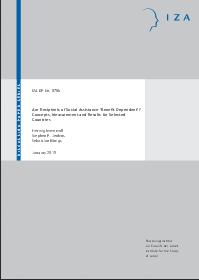Immervoll, H., Jenkins, P. S. & Königs, S. (2015) “Are Recipients of Social Assistance ‘Benefit Dependent’? Concepts, Measurement and Results for Selected Countries“, Institute for the Study of Labor (IZA), Discussion Paper No. 8786, Ιανουάριος 2015. ABSTRACT Are Recipients of Social Assistance ‘Benefit Dependent’? Concepts, Measurement and Results for Selected Countries Means-tested Social Assistance (SA) benefits play an important role as social protection floors supporting households in financial difficulties. …Read More
Quantitative easing in euro zone requires shared risk
Gros, D. & Kopf, C. (2015) “Quantitative easing in euro zone requires shared risk“, Centre for European Policy Studies: Economic Policy, Researchers’ work published externally, 21 Ιανουαρίου. In their column published online by Reuters, Daniel Gros and Christian Kopf offer their assessment of the programme of sovereign bond purchases to be undertaken shortly by the European Central Bank in the euro area. They examine in particular the accounting technique …Read More
Tsipras And Syriza’s Win Reboots European Social Democracy
Gow, D. (2015) “Tsipras And Syriza’s Win Reboots European Social Democracy“, Social Europe Journal, 26 Ιανουαρίου. The “vicious circle of austerity is over,” said Alexis Tsipras, Syriza leader and Greece’s likely new premier, after his party won a stunning victory in yesterday’s general election. It would be replaced, he added, by “a politics of hope, solidarity and co-operation.” He and his senior colleagues say this is true for the …Read More
The return of the German question: why conflict between creditor and debtor states is now the defining feature of European politics
Kudnani, H. (2015) “The return of the German question: why conflict between creditor and debtor states is now the defining feature of European politics“, LSE EUROPP, 26 Ιανουαρίου. One of the key geopolitical issues in Europe prior to the Second World War was how the power of Germany could be effectively balanced by other European states. Hans Kundnani assesses the relevance of these historical debates to the current situation …Read More
Η τελευταία και καλύτερη ελπίδα της Ευρώπης
Neil, Irwin, (2015), “Η τελευταία και καλύτερη ελπίδα της Ευρώπης”, Η Καθημερινή, 23 Ιανουαρίου. Το πρόγραμμα που ανακοίνωσε χθες ο Μάριο Ντράγκι και αποτελεί προσπάθεια να ανασυρθεί η ευρωπαϊκή οικονομία από την ύφεση έρχεται με καθυστέρηση μηνών, είναι μικρό σε σύγκριση με τα αντίστοιχα σε ΗΠΑ και Ιαπωνία, και περίπλοκο για να ικανοποιήσει πολιτικές σκοπιμότητες. Ισως, όμως, είναι η τελευταία και καλύτερη ελπίδα της Ευρώπης να μη διολισθήσει σε μία …Read More
Grexit 2015: A primer
Gros, Daniel, (2015), “Grexit 2015: A primer”, CEPS Commentaries, 23 Ιανουαρίου. In the run-up to the Greek elections on January 25th and the subsequent renegotiation of the country’s economic adjustment programme with the troika, Daniel Gros writes in this Commentary that “nobody officially wants Grexit”: not Syriza, which wants Greece to stay in the euro. It is ‘only’ asking for a reduction in Greece’s official debt and an end to …Read More
The ECB has fired its bazooka
Wolff, Guntram, Merler, Silvia, (2015), “The ECB has fired its bazooka” , Bruegel, 23 Ιανουαρίου. The ECB announced today an expansion of its asset purchases, to include securities issued by European agencies and institutions, as well as central government in the euro area. Purchases are intended to be continued until at least September 2016 and in any case until the Governing Council sees a sustained adjustment in the path of …Read More
The ECB’s New Macroeconomic Realism
Jeffrey D. Sachs, (2015), “The ECB’s New Macroeconomic Realism”, Project Syndicate, 23 Ιανουαρίου. The European Central Bank has finally launched a policy of quantitative easing (QE). The key question at this stage is whether Germany will give the ECB the freedom of maneuver needed to carry out this monetary expansion with sufficient boldness. Though QE cannot produce long-term growth, it can do much to end the ongoing recession that has …Read More
The ECB’s bond-purchase dilemma – German opposition to government-bond purchases by the European Central Bank is solidifying ahead of the programme’s likely announcement
Wolff, Β. G., Fratzscher, M. & Hüther, M. (2015) “The ECB’s bond-purchase dilemma – German opposition to government-bond purchases by the European Central Bank is solidifying ahead of the programme’s likely announcement“, Bruegel Institute, 21 Ιανουαρίου. German opposition to government-bond purchases by the European Central Bank is solidifying ahead of the programme’s likely announcement on January 22. Elections in Greece that could bring a government that will seek to …Read More
Opening of national research programs: different national answers to international pressures?
Primeri, Ε. (2015) “Opening of national research programs: different national answers to international pressures?“, Europe of Knowledge Blog, Ideas on Europe, 16 Ιανουαρίου. In a funding and policy context as deeply changed as the European one, the opening of national research programs has become an important instrument for national governments and funding agencies to increase international collaboration and to improve the quality and efficiency of scientific research. The opening …Read More







